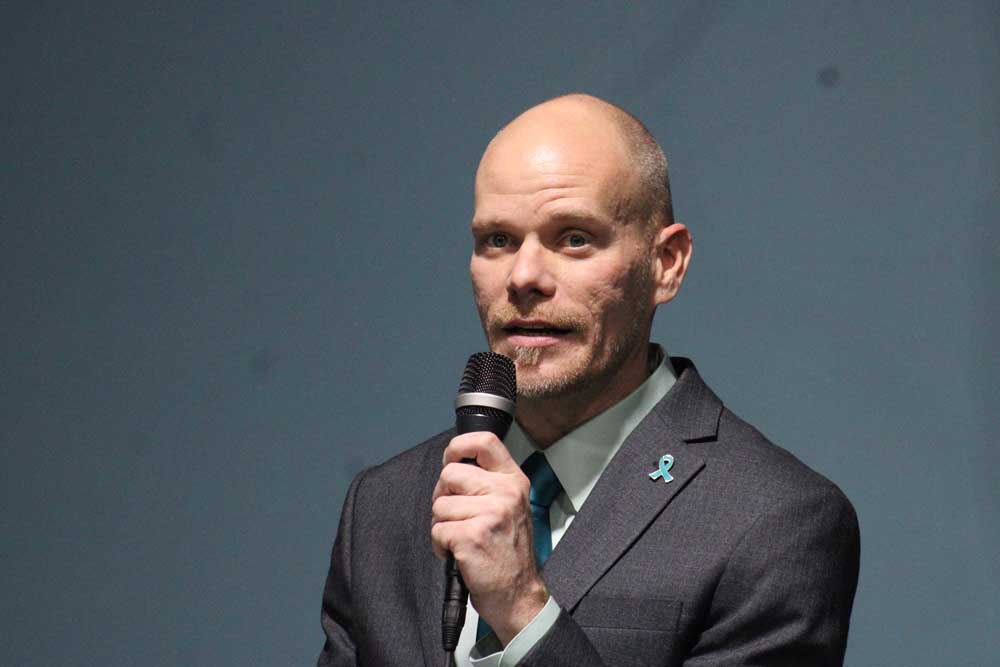East Texas Crisis Center hosts forum on sexual assault awareness
Published 12:46 pm Monday, April 7, 2025

- Jeremy Flowers, Director of Coordinated Community Response for the East Texas Crisis Center (Jennifer Scott/Tyler Morning Telegraph)
In honor of Sexual Assault Awareness Month, the East Texas Crisis Center hosted a forum last Tuesday at the Tyler Public Library. The event brought together a panel of community leaders, including Jacob Putman, Smith County district attorney; Maya Golden Bethany, executive director and founder of the 1 in 3 Foundation; Nichole Henry, executive director of the East Texas Crisis Center; and Jimmy Toler, chief of the Tyler Police Department.
Jeremy Flowers, director of Coordinated Community Response for the East Texas Crisis Center, said he appreciates the panel’s willingness to engage in tough conversations surrounding sexual violence.
“I think it is really incredible to have community leaders who are willing to engage in difficult conversations surrounding sexual violence in our community,” Flowers said. “These are conversations that are necessary and need to be had so that we can ensure that survivors are receiving the support that they need and also that we as a community are collaborating in our efforts to prevent sexual violence.”
Bethany, a child sexual abuse survivor herself, spoke about the misconceptions and stigmas that often prevent victims from coming forward.
“One of the most prevalent things that comes up a lot of times is feeling that no one’s gonna believe them,” she said. “There are instances where this person, the perpetrator, might be a narcissist and people think that they’re a great person, or they might be in a position of leadership or have some type of power over the victim. They might even be revered in the community, and so that can create that barrier.”
Discussing the challenges survivors of sexual assault face, Bethany emphasized how rare it is for experiences to be fabricated due to the difficulty of speaking out. She also noted that internalized stigmas, such as shame, guilt, and self-blame, often weigh heavily on victims.
Additionally, survivors are frequently gaslit, with societal pressures prompting questions like, “Why were you at that party?” or “Why were you drinking?” These inquiries contribute to victim-blaming narratives. Bethany pointed out that cultural and societal attitudes need to shift, emphasizing the importance of empathy and rejecting the tendency to blame victims.
“The biggest advocacy is… listen and support and believe survivors,” Bethany said. “We can’t stress that enough, especially when it’s a child. That’s a tremendous thing for a child to come forward for, it’s a tremendous thing for anyone to come forward for.”
Toler, speaking from a law enforcement perspective, highlighted that the police academy has a curriculum specifically focused on responding to sexual assault cases. Every two years, officers receive additional training to improve their handling of such cases and their communication with victims.
“The trauma they’re going through, you wanna make sure you don’t compound on it at the same time,” he said. “But it gives them that empathy and that comfort while you’re conducting further investigation, and to make sure they know who to call—all those additional resources like the crisis center… they can help us walk through that process.”
Putman addressed how the legal system balances the rights of both victims and offenders, noting that offenders’ rights often take precedence over the concerns of survivors. He explained that constitutional protections, like the right to face the accuser, require that if someone accuses another in court, the accused must be able to see and interact with the accuser—a challenge for many survivors.
“The criminal justice system was not built for victims,” Putman said. “It was built for offenders and to hold them accountable, but because it’s to hold them accountable.”
Putman also discussed the importance of recent legal updates designed to protect survivors, such as laws that prevent defense attorneys from introducing irrelevant sexual history in court, helping to shield survivors from further trauma.
“There are special laws for survivors,” Putman said. “If you’re testifying, (defense attorneys) don’t get to ask you about prior sexual history and things like that to try to prevent shaming for things that are not relevant to the trial. There are rules in place and laws where the news is not allowed to broadcast your name or your image.”
While law enforcement and attorney’s offices work to offer safety and security for survivors, resources like the East Texas Crisis Center play a crucial role in providing additional support. The Crisis Center offers services such as counseling, legal advocacy, and a safe space for survivors to heal.
“I really think the biggest challenge is, although we’ve seen the increase, thanks to the MeToo movement, there is still that stigma attached to reporting,” Henry said. “There is still a lack of understanding and compassion in the community as to what is a sexual assault.”
Bethany also emphasized the importance of recognizing that family members, friends, and partners of survivors face their own struggles. She said it’s essential to provide support not only to survivors but also to those close to them.
“I get a lot of calls from moms, grandmothers asking ‘how do I help?’ and I have to tell them that they (survivors) have to be the one to make the call, but you also need to take care of yourself,” Bethany said. “So when we talk about community, we talk about mental health, this isn’t just a survivor or a perpetrator problem. It is a community problem because we all work with, know, (or) are related to a survivor, and it’s important to make sure that you’re taking care of yourself too while they’re also on their healing journey.”
For more information, visit the East Texas Crisis Center at etcc.org or learn more about the 1 in 3 Foundation at www.1in3foundation.org.

